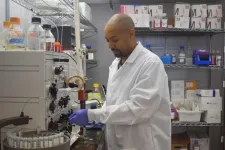(Press-News.org) Depression can affect anyone. It is common, and in many cases severe. These days, there are good treatments available, typically involving a combination of psychotherapy and medication. However, finding the right treatment can take some time. Not everyone responds equally well to every medication. Researchers at six European university medical centers, led by Charité – Universitätsmedizin Berlin, teamed up to accelerate the process of arriving at solid findings relating to both new and known treatments. The key will be a joint study design, supported over the coming four years with more than 13 million euros (£11.7m) in funding from Wellcome.
According to the World Health Organization (WHO), severe depression is among the main drivers of the global burden of disease. Although there are many medications available to treat depression – some 30 antidepressants are approved in Germany alone – sustained improvement remains out of reach for some patients, in spite of multiple attempts using different treatment approaches. Why is that, and how can clinicians find out faster what really helps specific patients? Researchers at six member institutions of the European University Hospital Alliance (EUHA) are working together systematically in the PEARLDIVER project to find answers.
“Pearls” of depression research
Clinical trials are the basis of evidence-based medicine. However, many of the studies performed are not meaningful enough to yield sound conclusions for clinical practice. In many cases, the available treatments are only effective for some patients, and approval of new drugs for mental health conditions lags behind that of medications for other medical fields, such as oncology, infectious disease, and neurology.
“For patients with depression who do not respond to the first treatment, there is a huge need for evidence-based, safe and effective new therapies,” explains Prof. Christian Otte, Director of the Department of Psychiatry and Neurosciences on the Charité Campus Benjamin Franklin and medical director of the large-scale European project. He has high hopes for the structured new approach: “Our platform study will significantly accelerate the development and testing of treatments for depression. At the same time, we will be able to clarify faster which of the therapies that are already available is most promising for a specific individual.”
One structure – many studies
To find the “pearls” of depression research and make new treatments available swiftly, the researchers have turned to the highly efficient platform study method. While new or existing treatment approaches have previously been evaluated in individual studies, in which patients are assigned at random to either the intervention group or a control group, a platform study relies on a shared infrastructure and shared control group to evaluate many different treatment approaches while still retaining the principle of random group assignment.
“Clinical trials are very resource-intensive. They are time-consuming and require a lot of effort. The previous practice has been to set up the entire infrastructure and all the logistics for each study fresh from the start. You could think of it as building a new stadium for every soccer game. In PEARLDIVER, we’re taking a different route. Metaphorically speaking, we’re building a big stadium together as the first step, and then all of the partners can use that infrastructure for an almost unlimited number of games – or, in our case, studies,” explains Prof. Stefan Gold, professor of clinical neuroscience at Charité and the project’s scientific director. “In addition to speeding up the process, this also makes the individual studies more meaningful and comparable.”
The goal is to build a Europe-wide research infrastructure over the next four years to allow researchers to arrive at solid findings aligned with the highest possible scientific standards in comparisons of treatment and control groups to study new and known treatment approaches. The first year will primarily focus on building the platform. Subsequently, the platform will assess the safety and efficacy of the first two new medications for depression to demonstrate the trial’s suitability and efficiency, with plans to add more treatments over time. Enrolment of participants is expected to start in 2026.
Patients have a voice
Platform studies are already successfully in use in other fields of medicine, such as oncological research. This approach is new to mental health. Another new aspect is that patients themselves played a role in designing the study as cooperation partners. The patient representative, Fanni-Laura Mäntylä, explains: “Our goal is to work together to find better solutions for how clinical trials in mental health are designed and run; how mental health treatment evolves; how to better help people with mental health challenges.” The European Patients’ Forum (EPF) is supporting the project.
Since multiple treatments can be reviewed at one and the same time, having a reusable infrastructure is extremely efficient. It represents less of a burden for study participants. Regulatory and ethical approval processes also take less time. Interim analyses permit rapid conclusions as to whether a treatment will be promising, and obviously ineffective study arms can also be discontinued quickly.
“This innovative platform study approach is very exciting because it will make testing new treatments for depression far more efficient and streamlined. It will help researchers collaborate to find answers about whether treatments are effective and for whom they would work best,” says Dr. Kim Donoghue, Senior Research Manager at Wellcome. This project to study depression, the largest Europe-wide, may also serve as a model for other mental health issues.
About Wellcome
Wellcome supports science to solve the urgent health challenges facing everyone. We support discovery research into life, health and wellbeing, and we’re taking on three worldwide health challenges: mental health, infectious disease and climate and health.
Links
Department of Psychiatry and Neurosciences at CBF
Predecessor project: EU-PEARL supported by the IHI
About Wellcome
Contact
Prof. Christian Otte
Director of the Department of Psychiatry and Neurosciences
Campus Benjamin Franklin
Charité – Universitätsmedizin Berlin
T: +49 30 450 517 501
END
Depression – discovering faster which treatment will work best for which individual
First Europe-wide platform study on the safety and efficacy of treatments
2025-01-10
ELSE PRESS RELEASES FROM THIS DATE:
Breakthrough study reveals unexpected cause of winter ozone pollution
2025-01-10
Researchers from the Hong Kong Polytechnic University, alongside mainland collaborators, have uncovered an unexpected phenomenon: severe wintertime ozone (O₃) pollution in Lanzhou, China, driven primarily by alkene emissions from local petrochemical industries. Traditionally associated with warm weather and strong solar radiation, hourly O₃ levels exceeding 100 ppbv were recorded during cold January days in 2018, peaking at an alarming 121 ppbv.
Using an advanced photochemical box model, the study identified alkene ozonolysis as ...
nTIDE January 2025 Jobs Report: Encouraging signs in disability employment: A slow but positive trajectory
2025-01-10
East Hanover, NJ – January 10, 2025 – The employment-to-population ratio for people with disabilities has remained stable over the past 15 months amid historically high levels, with recent data suggesting a modest but encouraging upward trend, according to today’s January 2025 National Trends in Disability Employment monthly update (nTIDE) issued by Kessler Foundation and the University of New Hampshire’s Institute on Disability (UNH-IOD).
Month-to-Month nTIDE Numbers (comparing November 2024 to December 2024)
Based on data from the U.S. Bureau of Labor Statistics (BLS) ...
Generative AI: Uncovering its environmental and social costs
2025-01-10
A recent commentary article by researchers from Northwestern University, Harvard University, and The University of Texas at San Antonio highlights the significant but overlooked environmental and social impacts of Generative Artificial Intelligence (GenAI). Published in Environmental Science and Ecotechnology, the research underscores the urgent need for sustainable practices and ethical governance as GenAI technologies proliferate.
The study reveals the environmental toll of GenAI development, with hardware production such as GPUs and data centers consuming ...
Lower access to air conditioning may increase need for emergency care for wildfire smoke exposure
2025-01-10
FOR IMMEDIATE RELEASE
January 10, 2025
Contact:
Jillian McKoy, jpmckoy@bu.edu
Michael Saunders, msaunder@bu.edu
##
Lower Access to Air Conditioning May Increase Need for Emergency Care for Wildfire Smoke Exposure
As Los Angeles County battles the most destructive wildfires in its history, a new study suggest that US policies should prioritize equity and education regarding the measures people can take to protect themselves from the harmful pollutants in wildfire smoke.
People who have limited access to air ...
Dangerous bacterial biofilms have a natural enemy
2025-01-10
If your teeth have ever felt fuzzy after skipping a brushing, you’ve encountered biofilm—a slimy bacterial layer that clings to surfaces. In medical settings, biofilms make infections harder to treat when they form protective shields for bacteria on devices like catheters and implants.
UC Riverside scientists have now discovered a chemical that plants produce when they're stressed prevents biofilm from forming. The breakthrough offers potential advances in healthcare as well as preventing equipment corrosion in industrial settings.
“In simple terms, biofilms are communities ...
Food study launched examining bone health of women 60 years and older
2025-01-10
Hinda and Arthur Marcus Institute for Aging Research investigators at Hebrew SeniorLife have launched a large clinical food trial to test whether a combination of probiotics and prebiotics (BondiaÒ or SBD111) developed by Solarea Bio will help manage bone health in women aged 60 years and above. The first participants have joined the study and the Institute seeks additional women for the 18-month effort.
“I am very happy to be involved in this important research to help with bone health in women,” says study participant Kathy ...
CDC awards $1.25M to engineers retooling mine production and safety
2025-01-10
From mapping ore to predicting slope behavior and reclaiming land, mining is a rapidly evolving technological industry. Yet planning and operations have not necessarily kept up with the advancements.
With $1.25 million from the National Institute for Occupational Safety and Health, or NIOSH, mining and geological engineering researchers in the University of Arizona College of Engineering are boosting their efforts to better align technology and planning for improved safety and productivity.
The award from the institute, part of the Centers for Disease Control and Prevention, will fund the research ...
Using AI to uncover hospital patients’ long COVID care needs
2025-01-10
PHILADELPHIA— Across the United States, no hospital is the same. Equipment, staffing, technical capabilities, and patient populations can all differ. So, while the profiles developed for people with common conditions may seem universal, the reality is that there are nuances that require individual attention, both in the make-up of the patients being seen and the situations of the hospitals providing their care.
New research shows that artificial intelligence can potentially help improve care overall by combing through ...
$1.9M NIH grant will allow researchers to explore how copper kills bacteria
2025-01-10
TUCSON, Arizona — A researcher at the University of Arizona College of Medicine – Tucson received a $1.9 million grant from the National Institutes of Health to continue his research into uncovering the mysteries of copper – specifically, how it can be harnessed to kill harmful bacteria and other microorganisms.
“We started using copper tens of thousands of years ago to cut down on bacterial infections,” said Michael D.L. Johnson, PhD, an associate professor ...
New fossil discovery sheds light on the early evolution of animal nervous systems
2025-01-10
Embargoed until Friday 10-Jan-2025 14:00 ET (10-Jan-2025 19:00 GMT/UTC)
An international team of scientists has uncovered a fascinating piece of the evolutionary puzzle: how the ventral nerve cord, a key component of the central nervous system, evolved in ecdysozoan animals, a group that includes insects, nematodes, and priapulid worms. Their findings, published in Science Advances, provide valuable insights into the origins of these structures in the basal Cambrian period.
The research team, comprising Dr Deng Wang (Northwest University), Dr Jean Vannier (Université ...
LAST 30 PRESS RELEASES:
Local water supply crucial to success of hydrogen initiative in Europe
New blood test score detects hidden alcohol-related liver disease
High risk of readmission and death among heart failure patients
Code for Earth launches 2026 climate and weather data challenges
Three women named Britain’s Brightest Young Scientists, each winning ‘unrestricted’ £100,000 Blavatnik Awards prize
Have abortion-related laws affected broader access to maternal health care?
Do muscles remember being weak?
Do certain circulating small non-coding RNAs affect longevity?
How well are international guidelines followed for certain medications for high-risk pregnancies?
New blood test signals who is most likely to live longer, study finds
Global gaps in use of two life-saving antenatal treatments for premature babies, reveals worldwide analysis
Bug beats: caterpillars use complex rhythms to communicate with ants
High-risk patients account for 80% of post-surgery deaths
Celebrity dolphin of Venice doesn’t need special protection – except from humans
Tulane study reveals key differences in long-term brain effects of COVID-19 and flu
The long standing commercialization challenge of lithium batteries, often called the dream battery, has been solved.
New method to remove toxic PFAS chemicals from water
The nanozymes hypothesis of the origin of life (on Earth) proposed
Microalgae-derived biochar enables fast, low-cost detection of hydrogen peroxide
Researchers highlight promise of biochar composites for sustainable 3D printing
Machine learning helps design low-cost biochar to fight phosphorus pollution in lakes
Urine tests confirm alcohol consumption in wild African chimpanzees
Barshop Institute to receive up to $38 million from ARPA-H, anchoring UT San Antonio as a national leader in aging and healthy longevity science
Anion-cation synergistic additives solve the "performance triangle" problem in zinc-iodine batteries
Ancient diets reveal surprising survival strategies in prehistoric Poland
Pre-pregnancy parental overweight/obesity linked to next generation’s heightened fatty liver disease risk
Obstructive sleep apnoea may cost UK + US economies billions in lost productivity
Guidelines set new playbook for pediatric clinical trial reporting
Adolescent cannabis use may follow the same pattern as alcohol use
Lifespan-extending treatments increase variation in age at time of death
[Press-News.org] Depression – discovering faster which treatment will work best for which individualFirst Europe-wide platform study on the safety and efficacy of treatments



